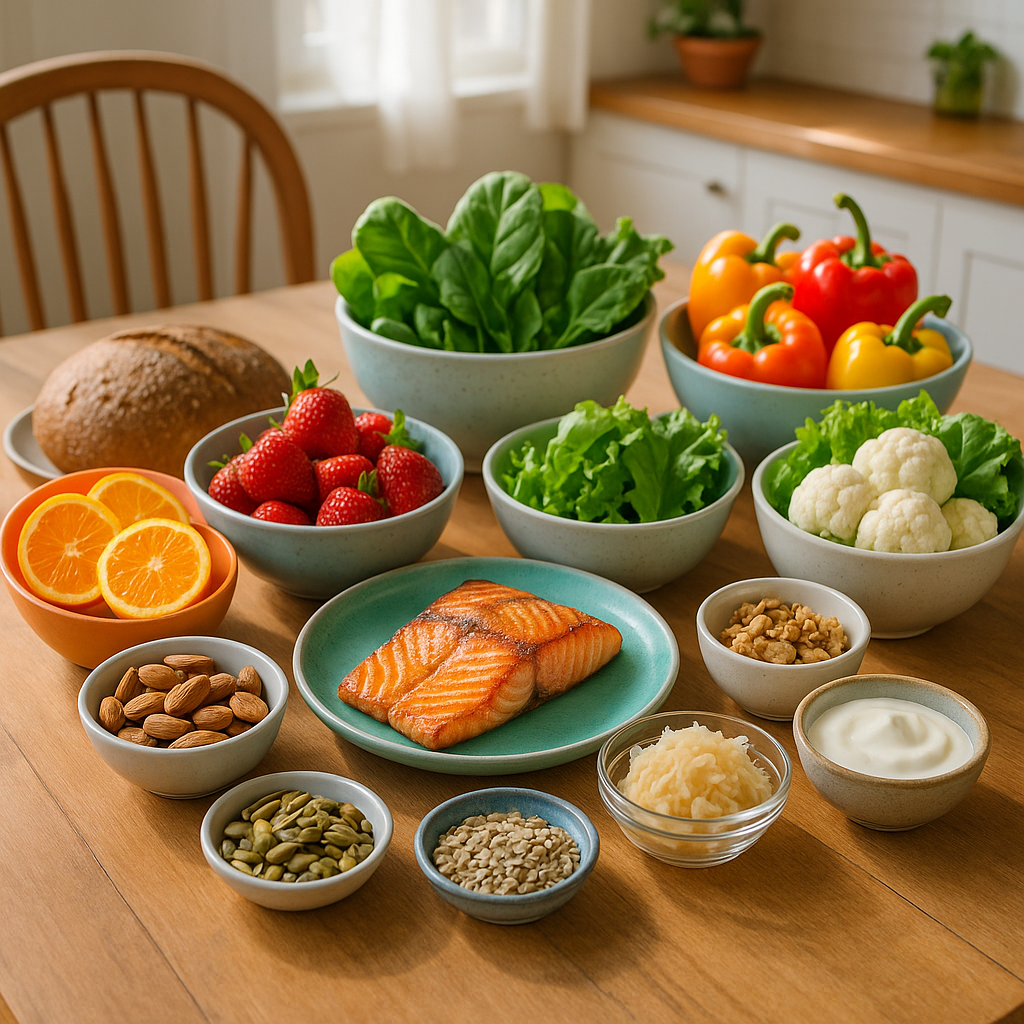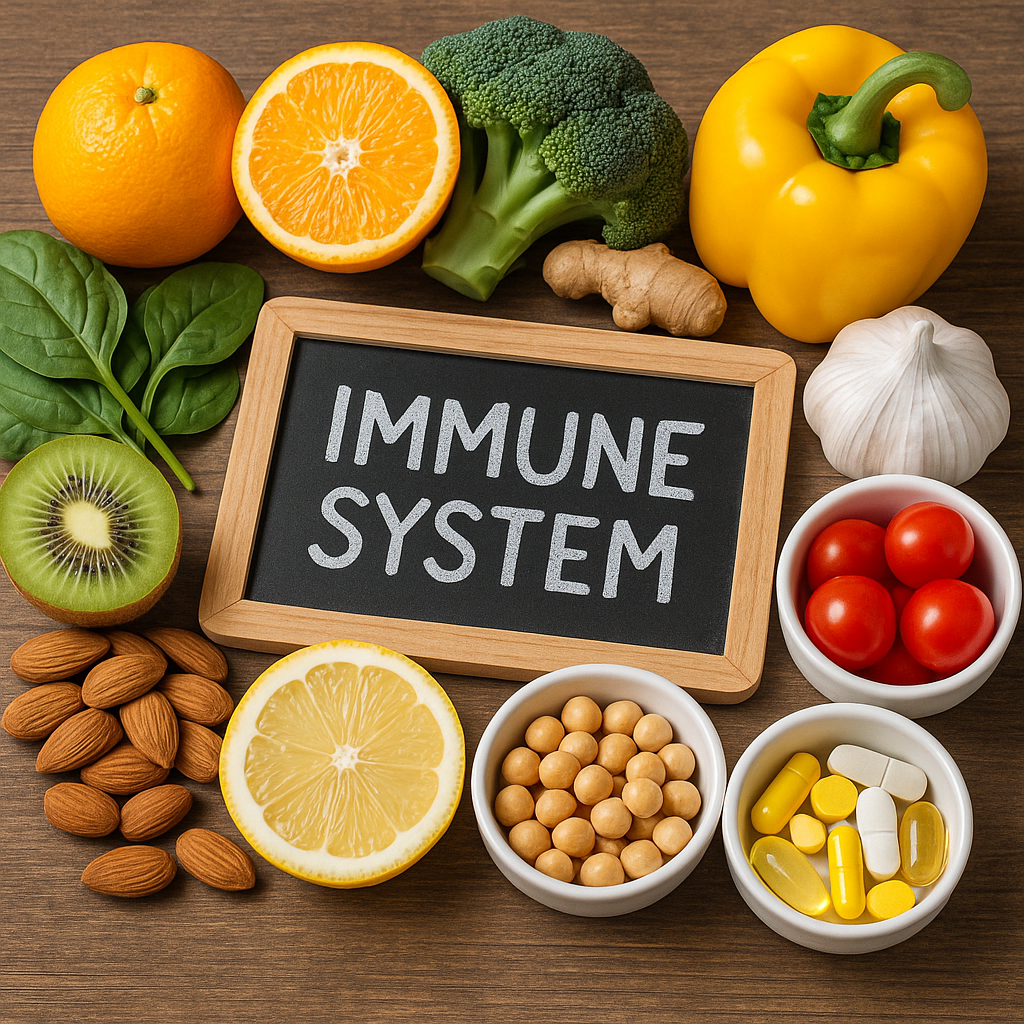The immune system is a complex network of cells, tissues, and organs whose primary function is to protect the body from various pathogens. A strong immune system helps us stay healthy during cold season, recover from illnesses, and cope with everyday challenges. It is often thought that boosting immunity is all about taking supplements, but the truth is that our lifestyle, diet, and daily habits have the greatest impact on the functioning of the immune system. In this article, we will explore seven effective strategies that will help strengthen the body’s natural defense mechanisms and maintain optimal health.
A Balanced Diet to Strengthen Immunity
The immune system needs a variety of nutrients to function properly. A balanced diet is one of the most important factors in maintaining a strong immune system.
Vitamin C is one of the best-known immune-boosting vitamins. It increases the production of white blood cells and improves their function. This vitamin is abundant in citrus fruits, strawberries, peppers, and leafy vegetables. Vitamin D deficiency is common in Lithuania, especially during the darker months of the year when sunlight is limited. This vitamin helps regulate immune system function and reduces inflammation. Its sources include fatty fish, egg yolks, mushrooms and fortified dairy products.
Antioxidants, such as vitamins A and E, are also very important in fighting free radicals that can damage cells and weaken the immune system. You can find vitamin A in carrots, sweet potatoes and spinach, while vitamin E is found in nuts, seeds and vegetable oils.
Minerals also play an important role in supporting the immune system.

Zinc, found in seafood, meat, beans, and seeds, helps regulate immune cell activity. Selenium, found in Brazil nuts, fish, and chicken, helps reduce inflammation and boost the immune system.
Probiotics, found in fermented foods like yogurt, sauerkraut, and kefir, support the good bacteria in your gut, which is essential for immune health. They help maintain a healthy gut microbiome, which plays a key role in immune response. The connection between gut health and immunity is crucial, as about 70% of our immune system resides in our gut.
Practical nutrition tips
- Eat at least five servings of fruits and vegetables a day
- Include whole grains in your diet, which help support the growth of good bacteria in your gut
- Limit sugar intake, as it can inhibit the ability of white blood cells to kill bacteria
- Drink plenty of water – good hydration ensures that toxins are flushed out of your body
- Consume spices like garlic, ginger and turmeric, which have anti-inflammatory properties
Regular physical activity
Exercise is one of the key factors in boosting your immune system. Regular, moderate-intensity physical activity can improve your immune system in several ways.
Physical activity helps improve blood circulation, which allows immune cells to move more efficiently around the body and recognize and fight infections. Regular exercise also reduces inflammation in the body, which can weaken the immune system over time.
Studies show that moderate-intensity physical activity for 30-60 minutes a day can reduce the risk of upper respiratory infections and shorten the duration of illness. However, too much or too long of a workout can have the opposite effect and temporarily weaken immunity, so it’s important to find a balance.
Recommended forms of physical activity to strengthen immunity:
- brisk walking or light jogging
- cycling
- swimming
- yoga or pilates, which not only strengthen muscles but also reduce stress
- dancing or aerobics at home
- gardening
It is especially worth noting that physical activity outdoors, in the fresh air, provides additional benefits – the body receives more vitamin D, which is necessary for the immune system.

Even a short 20-30 minute walk every day can have a positive effect on the immune system.
High-quality immune system-boosting supplements can be a great help for active people, especially during intense physical exertion or recovery periods.
Quality sleep and rest
Adequate rest is one of the most important, but often underestimated, factors that strengthen the immune system. Sleep is a time when the body regenerates and strengthens its defenses.
Scientific studies show that during deep sleep, the body produces cytokines – protein substances that help regulate the immune response to infections and inflammation. Insufficient sleep reduces the production of these important substances, making it more difficult to fight diseases. In addition, long-term sleep deprivation increases the risk of chronic inflammation, which can weaken the immune system.
Adults are recommended to sleep 7-9 hours a day, and adolescents and children – even more. Not only the duration of sleep is important, but also its quality. Here are some tips to improve your sleep quality:
- Create a quiet, dark, and cool bedroom environment
- Go to bed and wake up at the same time every day, even on weekends
- Avoid using electronic devices an hour before bed (blue light disrupts melatonin production)
- Limit caffeine intake after noon
- Create a bedtime ritual that helps you relax (e.g., hot bath, reading, meditation)
It’s important to understand that rest is not just about sleeping.

Regular breaks during the day, weekends and holidays are also essential for the body to recover and maintain a strong immune system. Research shows that immunity and sleep are closely linked – the better rested we are, the stronger our defenses against disease.
Effective stress management
Long-term stress can have a negative impact on the immune system, so managing it is essential for maintaining good health.
When we are stressed, the body produces the stress hormone cortisol, which, when constantly elevated, suppresses the immune system’s response and prevents it from effectively fighting infections. Long-term stress also causes chronic inflammation in the body, which further weakens the immune system and increases the risk of various diseases.
There are many proven ways to effectively manage stress and strengthen your immune system:
- regular meditation or conscious breathing practices – studies show that even 10 minutes of daily meditation can reduce stress levels
- physical activity, which stimulates the release of endorphins – natural mood-enhancing hormones
- time in nature – walks in the forest, park or by a body of water help to relax and reduce stress hormone levels
- favorite activities and hobbies that bring joy and help you get away from everyday worries
- social connections – communication with loved ones and friends provides emotional support and helps you cope with stress more easily
In today’s world, it is especially important to pay attention to digital stress, which is caused by a constant flow of information and being connected to electronic devices. Regular digital breaks, limiting the time spent watching the news or using social networks can significantly reduce anxiety and stress.
Gut health and immunity are also linked to stress – when we are stressed, our gut microbiome changes, which can affect our immune system. So when we take care of stress management, we also take care of our gut health.
Digital Detox Practice
Different forms of digital detox can be very helpful in reducing stress:
- Set specific phone-free hours – especially when you wake up in the morning and before bed
- Turn off notifications during work to help you focus
- Limit social media use to 30 minutes a day
- Try to organize “screen-free time” on weekends – dedicate it to real-life experiences
Hygiene and preventive measures
Proper hygiene and preventive measures are simple but very effective ways to avoid infections and strengthen immunity.
Hand washing is one of the most important daily actions to help prevent illness. A study conducted by the World Health Organization showed that proper hand washing can reduce the risk of upper respiratory tract infections by up to 21%. Hands should be washed for at least 20 seconds with soap, especially before eating, after using the toilet, after public transport and when returning home.
In addition to hand washing, other important hygiene measures include:
- regular cleaning and disinfection of frequently touched surfaces at home and at work
- coughing and sneezing into your elbow, not your hands
- avoid touching your face with unwashed hands
- safe food preparation, proper handling of raw meat and vegetables
- regular teeth cleaning and oral hygiene – oral infections can reach other parts of the body and cause systemic inflammation
During the season when viruses are spreading, it is advisable to avoid close contact with sick people and, if possible, limit your presence in large gatherings of people. The Lithuanian Ministry of Health recommends that people with cold symptoms stay at home to prevent the spread of infections.
Regular ventilation of the home is also important – open the windows for at least a few minutes every day, even during the cold season, to change the indoor air and reduce the concentration of viruses in closed spaces.
Immune System Supplements
While a balanced diet should be the main source of nutrients, in some cases, nutritional supplements can be useful in strengthening the immune system, especially when there are gaps in the diet or increased body needs.
Vitamin C is one of the most popular immune system supplements. It helps increase the production of white blood cells and protects them from oxidative damage. Vitamin C supplements are especially useful in winter and spring, when the choice of fresh fruits and vegetables is smaller. The recommended daily dose for adults is 75-90 mg, but during colds, some studies suggest taking higher doses for a short time.
Vitamin D is extremely important for the immune system, and its deficiency is quite common in Lithuania due to the low amount of sunlight, especially in winter. When the skin does not receive enough sunlight, vitamin D supplements may be necessary. Lithuanian nutritionists often recommend taking vitamin D supplements from September to May.
Zinc is an essential mineral for immune function, helping to regulate immune responses and maintain the health of the skin, one of the body’s primary defenses. Studies show that zinc supplements taken within 24 hours of the onset of cold symptoms can shorten the duration of the illness.
Probiotics are live cultures of microorganisms that help maintain a healthy gut microbiota. Since a large part of the immune system is linked to the gut, probiotics can help boost immunity, especially after taking antibiotics or when you have an intestinal illness.
Echinacea is an herb with a long tradition of use to boost the immune system. Some studies suggest that it may help reduce the severity and duration of cold symptoms, although the scientific evidence is conflicting.
When taking supplements, it is important to follow a few basic principles:
- always consult your doctor before taking any supplements, especially if you have a chronic condition or are taking medication
- choose quality products from trusted manufacturers
- follow the recommended dosages – more is not always better
- supplements are not medicines and should not be used to treat illnesses without medical advice
- Check out our collection of natural immune-boosting supplements that can help supplement your daily healthy lifestyle routine.
Responsible use of vaccines and medical advice
Professional medical care and preventive healthcare are essential elements in strengthening immunity in the long term.
Vaccines are one of the most effective ways to strengthen adaptive immunity and protect against specific diseases. They work by “teaching” the immune system to recognize and fight specific pathogens. When the body encounters a real pathogen, it already knows how to respond quickly and effectively.
In Lithuania, it is recommended to get vaccinated against influenza every year, especially for people at risk – the elderly, those with chronic diseases, pregnant women and healthcare workers. In addition, it is recommended to get vaccinated against tick-borne encephalitis for people living in endemic areas.
Regular health check-ups help to detect potential health problems that may affect the immune system early. It is recommended to visit your family doctor at least once a year, and other specialists if necessary.
Before starting any supplement program, it is necessary to consult a doctor or pharmacist, especially if:
- you have a chronic illness
- you take medications regularly, as some supplements may interact with them
- you are pregnant or breastfeeding
- you have allergies or intolerances
- you are preparing for surgery
Medical professionals can help you create an individualized immune-boosting plan based on your personal needs, health status, and risk factors.

Conclusions
A strong immune system is the result of a comprehensive approach that encompasses various areas of life. By incorporating these seven factors into your daily life, you can significantly improve the function of your immune system:
- A balanced diet, rich in vitamins and minerals, is the foundation for a healthy immune system.
- Regular physical activity helps strengthen the immune system and reduce inflammation in the body.
- Quality sleep allows the body to recover and optimize the functioning of the immune system.
- Stress management ensures hormonal balance and reduces the negative impact on immunity.
- Proper hygiene and preventive measures help prevent infections.
- Supplements can help fill nutritional gaps, but should be used responsibly.
- Medical consultations and vaccines are professional solutions for strengthening immunity.
The most important thing is to start with small but sustainable changes – for example, adding more colorful vegetables to your diet, starting the day with a short walk, or establishing a regular sleep routine. Gradually, these small steps will become habits that will eventually strengthen your immune system and improve your overall well-being.
Remember that strengthening your immunity is not a short-term action, but an ongoing process that should become a natural part of your life. Consult your healthcare professional for individual advice and recommendations tailored to your health condition.
Frequently Asked Questions
What are the most effective natural ways to boost your immune system?
A healthy diet, regular physical activity, quality sleep, stress management, good hygiene and, when necessary, taking supplements are the most effective natural ways to boost your immune system.
What vitamins and minerals are most important for your immune system?
Vitamins C, D, A, E, as well as zinc and selenium are essential for your immune system, as they play an important role in supporting your body’s defenses.
How does stress affect your immune system?
Chronic stress increases cortisol levels, which suppresses your immune response and increases your risk of infections. Long-term stress causes chronic inflammation, which weakens your immune system’s overall function.
Are supplements necessary for your immunity if you eat a healthy diet?
Not always. Supplements can help fill nutritional gaps or when there is a greater need, such as during the winter, in older people or when experiencing greater stress. A complete diet usually provides sufficient amounts of nutrients.
How to naturally boost your child’s immunity?
Ensure a balanced diet, adequate sleep, regular physical activity outdoors and teach good hygiene habits. Always consult your pediatrician for individual recommendations.

